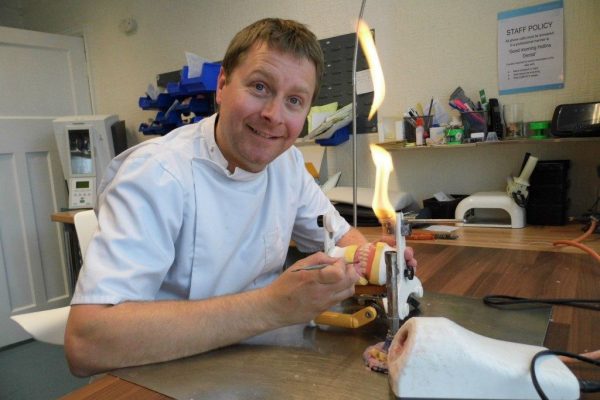A Clinical Dental Technician (CDT) plays a pivotal role in the dental health care field, providing specialised services that enhance the lives of many individuals, particularly those requiring dentures. This article explores who a Clinical Dental Technician is, their training, their responsibilities, and the benefits they offer to patients.
Who is a Clinical Dental Technician?
A Clinical Dental Technician is a dental professional who is qualified to both manufacture and fit dentures directly to patients. CDTs bridge the gap between the technical aspects of creating dental prostheses and the clinical application of these devices. This dual expertise allows them to provide a comprehensive service that ensures both the functional and aesthetic needs of patients are met.
Training and Qualifications
Becoming a Clinical Dental Technician requires extensive education and training. The typical path includes:
- Initial Training as a Dental Technician:
- CDTs usually begin their careers as dental technicians, gaining skills in designing and fabricating dental prostheses such as dentures, crowns, and bridges.
- CDTs usually begin their careers as dental technicians, gaining skills in designing and fabricating dental prostheses such as dentures, crowns, and bridges.
- Advanced Education:
- After gaining experience as a dental technician, individuals must complete additional specialised training in clinical practice. This often includes obtaining a diploma or degree in Clinical Dental Technology from an accredited institution.
- After gaining experience as a dental technician, individuals must complete additional specialised training in clinical practice. This often includes obtaining a diploma or degree in Clinical Dental Technology from an accredited institution.
- Licensure and Certification:
- In many regions, CDTs must be licensed or registered with a professional regulatory body. This ensures they meet the required standards for practice and continue to engage in ongoing professional development.
- In many regions, CDTs must be licensed or registered with a professional regulatory body. This ensures they meet the required standards for practice and continue to engage in ongoing professional development.
Responsibilities of a Clinical Dental Technician
A Clinical Dental Technician has a diverse range of responsibilities, combining both technical and clinical skills to deliver high-quality patient care:
- Patient Consultations:
- CDTs meet with patients to discuss their dental needs, conduct oral examinations, and take impressions of the mouth to create custom-fitted dentures.
- CDTs meet with patients to discuss their dental needs, conduct oral examinations, and take impressions of the mouth to create custom-fitted dentures.
- Design and Fabrication:
- Using the impressions and detailed patient information, CDTs design and fabricate dentures, ensuring they are functional, comfortable, and aesthetically pleasing.
- Using the impressions and detailed patient information, CDTs design and fabricate dentures, ensuring they are functional, comfortable, and aesthetically pleasing.
- Fitting and Adjustments:
- CDTs are responsible for fitting the dentures to the patient, making necessary adjustments to ensure a perfect fit and optimal comfort. They also provide aftercare and maintenance advice.
- CDTs are responsible for fitting the dentures to the patient, making necessary adjustments to ensure a perfect fit and optimal comfort. They also provide aftercare and maintenance advice.
- Repairs and Relines:
- In addition to creating new dentures, CDTs can repair and reline existing dentures, extending their lifespan and ensuring continued comfort and functionality.
- In addition to creating new dentures, CDTs can repair and reline existing dentures, extending their lifespan and ensuring continued comfort and functionality.
Benefits of Seeing a Clinical Dental Technician
Choosing to see a CDT offers numerous advantages for patients needing dentures:
- Expertise in Both Fabrication and Fitting:
- CDTs possess a unique combination of technical and clinical skills, allowing them to create dentures that not only fit well but also look natural and function effectively.
- CDTs possess a unique combination of technical and clinical skills, allowing them to create dentures that not only fit well but also look natural and function effectively.
- Personalised Care:
- CDTs provide personalised care tailored to each patient’s specific needs, preferences, and oral anatomy, leading to higher satisfaction rates.
- CDTs provide personalised care tailored to each patient’s specific needs, preferences, and oral anatomy, leading to higher satisfaction rates.
- Improved Communication:
- Because CDTs handle both the technical and clinical aspects of denture creation, there is less risk of miscommunication between the dentist and the technician, resulting in better outcomes for patients.
- Because CDTs handle both the technical and clinical aspects of denture creation, there is less risk of miscommunication between the dentist and the technician, resulting in better outcomes for patients.
- Convenience:
- Patients benefit from the convenience of having consultations, fittings, and adjustments all performed by the same professional, often in the same location.
- Patients benefit from the convenience of having consultations, fittings, and adjustments all performed by the same professional, often in the same location.
Conclusion
Clinical Dental Technicians play a crucial role in dental care, particularly for those requiring dentures. Their specialised training and dual expertise enable them to provide comprehensive, personalised, and high-quality care. By choosing to see a CDT, patients can enjoy the benefits of expertly crafted and well-fitting dentures that enhance their oral health and overall quality of life


